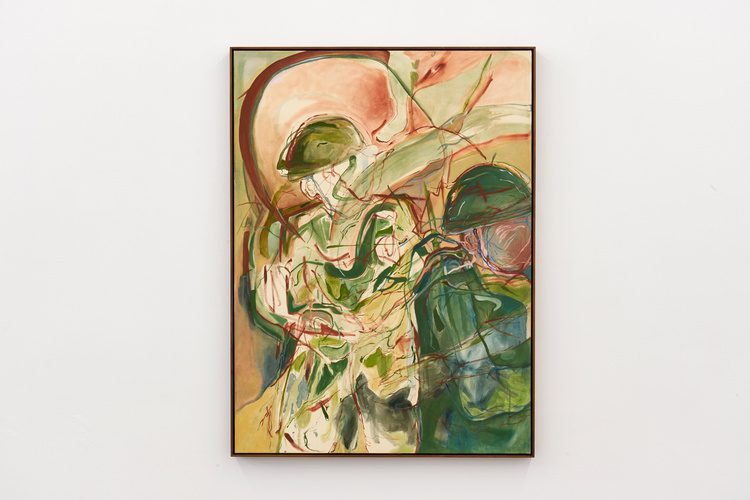blank projects, Cape Town, South Africa
08 Oct 2020 - 14 Nov 2020

Chemu Ng'ok, Double bind (2020) | Oil on canvas, 145 x 110 cm
blank presents Love your symptom, but not too much, an exhibition of works by Gerda Scheepers (b.1979, Tzaneen, South Africa), Chemu Ng’ok (b.1989, Nairobi, Kenya), Kresiah Mukwazhi (b.1992, Harare, Zimbabwe), Melike Kara (b.1985, Bensberg, Germany) and Olivia Sterling (b.1996, Peterborough, UK). Borrowing its title from one of Scheepers’ works, the exhibition is assembled around the shared medium of painting, but it also offers an opportunity to draw out those connections that exist beyond the reaches of paint.
Chemu Ng’ok presents two oil paintings, rendered in her typically painterly style of loose brush marks. Rendered in khaki and grey-green fatigues and topped with helmets, the figures in Ng’ok’s paintings are evidently soldiers. Faceless and uniform, they act as entry points from which to consider questions of power and systems of oppression. Through these works, Ng’ok asks the questions; who is able to exert power in society and under what conditions can power be confronted?
Sharing an interest in these questions and working in acrylic on modestly-sized canvasses saturated with colour, Olivia Sterling employs tactics of irony and humour to draw attention to the everyday acts of oppression – language and behaviour often dismissed as “innocent mishaps” – that lead to marginalisation and alienation. She stretches this concept to comical absurdity, emphasising the ridiculousness of racism, homophobia and xenophobia by comparing them to a goonish cartoon world in which we find a slapstick sequence of events: a pie being dropped on a lap, a person being stabbed with a fork, someone stepping on a skirt, eruptions of ketchup and cream and a dog stealing sausages.
Registered in a restrained palette of complex tones, Gerda Scheepers’ paintings take a less obvious narrative form, verging on abstraction. Beginning with photographs of previous sculptures as references, Scheepers works in thin layers of acrylic paint to create textured compositions that transcend the materiality of the original source. This process of addition and reduction promotes ambiguity, where the final image is open to interpretation, linked to the original sculpture only through psychological atmosphere or mood.
Melike Kara’s large-scale oil and acrylic painting, Yomund, is characterised by a combination of rhythm and symmetry. Unlike her previous works in which groups of colourful figures are more clearly evident, the figures in this work are masked and barely identifiable, traceable only through their various fleshy hues and vague outlines set against a recurring motif of white shapes. The embedded sense of hybridity found in the work speaks to ongoing processes of investigation engaged with by the artist – an interweaving of memories, stories and personal histories that pays homage to displaced people and cultures, both contemporary and historical – informed by her own family’s experience.
Combining paint with mixed media – fabric, lace, shoe straps, currency notes, party streamers, synthetic hair – Kresiah Mukhwazi’s Chemical Reactions broadens the formal scope of the exhibition. By incorporating these found objects and conceptually loaded materials, she gives character and texture to the crowd of figures nestled together. An ongoing concern in her practice, Mukhwazi’s work refers to personal experiences as well as current affairs to examine the politics of sexuality and gender-based violence.
By collapsing the distances between the artists’ localities and contexts, the exhibition gently nudges a conversation in which they can speak to each other, across place, through a relation in painting.